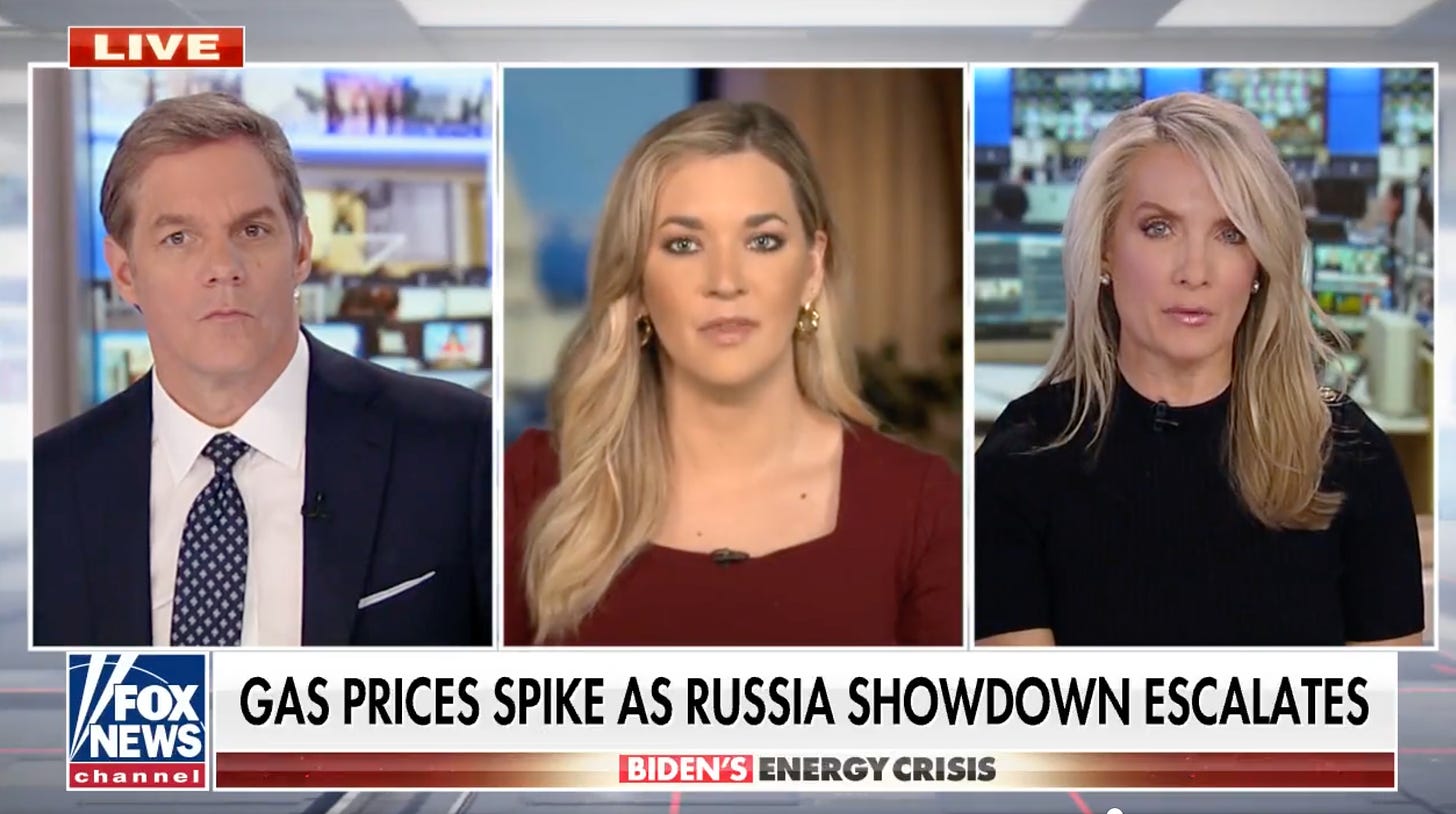Latest GOP Talking Point: Russia's Ukraine Invasion Happened Because of “Green Agenda”
Not wanting to let a crisis go to waste, the Fossil Fuel lobby pounces on Russia's invasion of Ukraine to go after climate activists.
Never letting a crisis go to waste, those long-opposed to the White House’s limited opposition to fracking and drilling for oil on U.S. federal lands are using the Russian invasion of Ukraine to insist that the modest shift of Europe, Canada and the U.S. to green energy has empowered and emboldened Russian President Vladimir Putin.















Clearly a memo went out—dozens of members of Congress and conservative commentators are repeating this line meant to connect the so-called “green agenda” to the invasion of Ukraine, pinning the deaths and disaster not on the party that actually did the invasion, Russia, but those ideologically strong-headed environmentalists. As Media Matters’ Zachary Pleat and Allison Fisher pointed out on Feb 10, this line of attack began in earnest weeks ago as GOP-aligned Sinclair Broadcasting Group began blaming the pending invasion on weak-kneed liberals’ climate policies.
It’s a clever line because it avoids a glaring messaging problem: a rising, more overtly white nationalist element in the Republican party that views Russia and Putin admirably. Former President Donald Trump has implicitly praised the invasion, and the most popular Fox News personality, Tucker Carlson, has as well. This leaves Republican Party messengers in a tough spot: They cannot call for direct NATO involvement because this would counter their de facto leader Trump, but they cannot look too pro-Putin either because of traditional neoconservative elements in the party (which they selectively call on to ding Biden over his Afghanistan withdrawal). They are thus torn between Owning the Libs and Staying On Message with Their Erratic White Nationalist Leader. So they have found a non sequitur third way: make this about bashing climate activists and promoting “energy independence,” a fossil fuel industry talking point designed to promote domestic production by playing to nationalist currents in America’s politics.
Oil industry consultant and Council on Foreing Relations board member Daniel Yergin argued in the Wall Street Journal last week this position for the middle brow set:
Today there is no doubting the geopolitical importance of America’s new oil-and-gas position. The Ukraine crisis and Europe’s energy crisis shine a light on the global impact of U.S. oil-and-gas production. Some saw this significance much sooner than others. At the 2013 St. Petersburg International Economic Forum, Vladimir Putin was on stage with German Chancellor Angela Merkel in front of several thousand people. I asked Mr. Putin how Russia planned to diversify its economy from its dependence on oil and gas export revenues. In the course of asking my question, I mentioned the word “shale.” Before I finished, Mr. Putin reacted sharply, denouncing shale gas as a grave threat that should be stopped.
Reflecting afterward, I realized he had two strong reasons to oppose U.S. shale gas. First, it would compete with Russian gas in Europe. Second, shale gas and oil would enhance America’s global strategic position. Given how events are unfolding in Europe today, one would have to say he was prescient.
You see, Putin is scared of shale gas production! If you oppose the horribly inefficient, environmentally destructive methane producing fossil fuel, you’re basically a Kremlin asset. It’s not the first time the oil and gas industry has used the specter of Helping the Bad Guys to demagogue against climate activists. In 2018, during Congressional investigation into Russian meddling in U.S. politics, Republicans seized on allegations Russian troll farm IRA “sowed division” in the U.S. by supporting protests against the TransCanada Corp.’s Keystone XL pipeline, insisting Russian intelligence “stirred opposition against the Dakota Access, Sabal Trail, Colonial and Bayou Bridge pipelines.” In 2014 when Russia annexed Crimea, Senators from both parties, including Democrat Mary Landrieu, argued the annexation showed the U.S. had to move forward with the XL oil Pipeline or else it would be empowering Russia.
In the coming weeks, concern trolling along these lines will no doubt intensify. One of the bleak byproducts of war—in addition to the civilians whose lives will be upended, and lost—is that it not only puts the urgent issue of climate chaos on the back-burner and makes global coordination that much more impossible, it actively weaponizes nationalist sentiment to carry out long existing hatred of climate movements. It’s war, and opposing America’s “energy independence” means you’re aiding the enemy. Never mind the fact that robust and stable domestic green energy—for all countries—would be the most effective long term strategy to remove fossil fuel politics from the equation for all violent actors, whether they be Russian or Western. Fossil fuel advocates will exploit this crisis like they’ve exploited all previous crises, and argue that the best way to prevent Putin from wielding fossil fuels isn’t to accelerate global cooperation to urgently wean off of fossil fuels, but shore up our own and use our leverage of earth warming against Putin’s leverage of earth warming.



